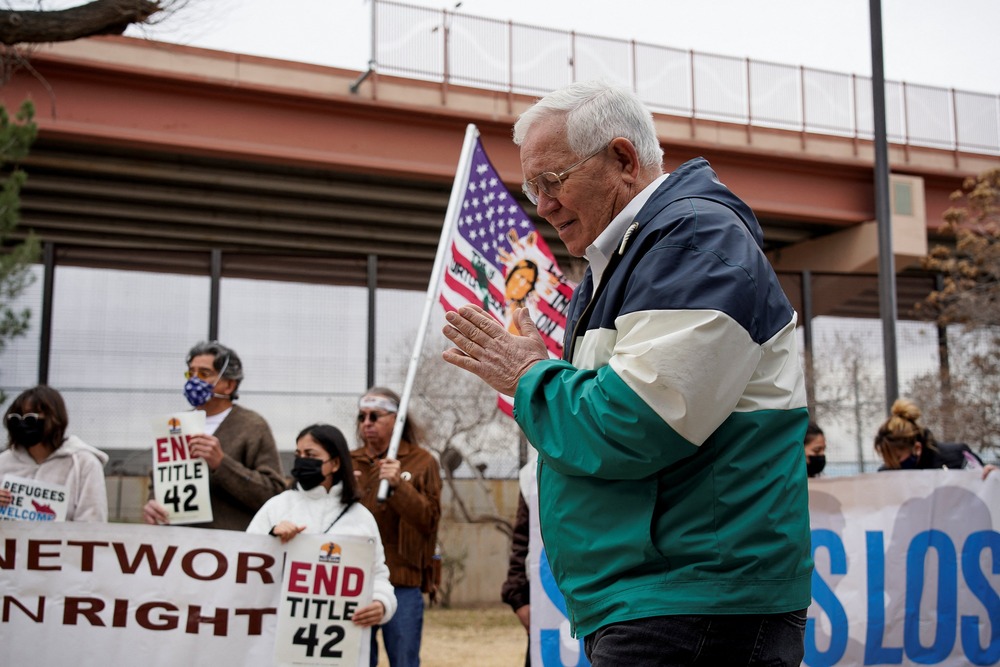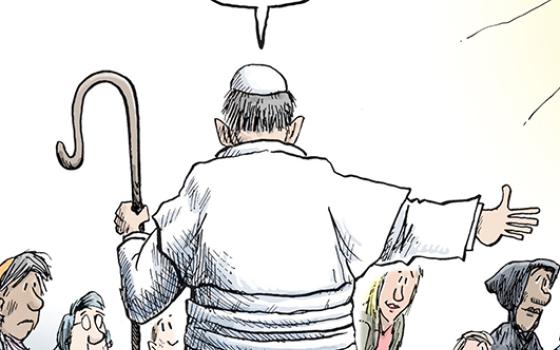
Ruben Garcia, director of Annunciation House, attends a march in downtown El Paso, Texas, Jan. 7, 2023, to demand an end to the immigration policy called "Title 42" and to support the rights of migrants coming to the border. A lawyer representing Annunciation House, a Catholic nonprofit serving migrants, told reporters shortly after a June 17, 2024, court hearing that Texas Attorney General Ken Paxton's attempt to shut down that ministry is an "attack on religious liberty." (OSV News/Paul Ratje, Reuters)
A lawyer representing Annunciation House in El Paso, Texas, a Catholic nonprofit serving migrants, told reporters shortly after a June 17 hearing in the case that Texas Attorney General Ken Paxton's attempt to shut down that ministry is an "attack on religious liberty."
In the hearing, attorneys for Paxton's office alleged Annunciation House runs "stash houses," facilitates illegal border crossings, conceals "illegally present aliens from law enforcement" and did not turn over documents in their investigation.
Annunciation House attorneys denied wrongdoing or illegal conduct and said Paxton's office did not adhere to appropriate legal processes for requesting documents from them. Annunciation House asked Judge Francisco Dominguez of the 205th District Court to block the attorney general's effort to shut down their ministry. Dominguez said he expects to issue a ruling within two weeks.
"We do believe it's an attack on religious freedom," Jerome Wesevich, a lawyer for Texas RioGrande Legal Aid, which is representing Annunciation House, said during a press conference after the hearing. Wesevich said sometimes controversial religious liberty cases center on "peripheral issues," or small-in-scope violations, but in the Annunciation House case, "what we're talking about is the fundamental teaching of Jesus: Love one another. No exceptions."
Wesevich added, "If that does not get protection ... what does? This is a disappointing attack on religious freedom in Texas, period."
Paxton's attempt to close Annunciation House, Wesevich said, is an "obvious attack on Annunciation House's practice of the Catholic faith and its command, 'Simply love one another.'"
In the suit, Paxton is trying to "exercise power he does not have" by claiming he can shutter Annunciation House for any violation of law, without demonstrating such a violation took place, Wesevich argued.
In court filings, Paxton's office appeared to downplay the "religious component" of Annunciation House's mission, arguing, "Instead, Annunciation House's members appear to subscribe to a more Bohemian set of 'seven commandments,' including commandments to 'visit' people when 'incarcerated' and 'care (for them) when they're sick.'"
However, those quotes come from a witness who appeared to be referring to what the Catholic Church calls the "seven corporal works of mercy," according to a review of the document by OSV News.
Asked about how Paxton's office framed Annunciation House's religious identity, Wesevich said, "That is a joke," citing the pope's recent comments in support of Annunciation House.
"There's no real dispute about Annunciation House's connection to Catholic values and its practice of Catholicism," he said, adding claims otherwise are "laughable."
Advertisement
Wesevich said Annunciation House is "a critical link in the very complex chain of organizations — governmental and nongovernmental — that permit a fair and humane treatment of people who cross the border," and that the ministry demonstrates its commitment to the legal process by helping those it serves to fill out their relevant legal paperwork to claim asylum or other official documentation.
Paxton's office did not immediately respond to a request for comment from OSV News.
At a June 13 press conference at the U.S. bishops' spring meeting, Archbishop Timothy P. Broglio, president of the U.S. Conference of Catholic Bishops, and El Paso Bishop Mark J. Seitz, the USCCB chair on migration, said the church would not back down from its obligation to care for migrants and refugees, and that social or political attempts to intimidate the church's work in this area are a religious liberty concern.
"Primarily, we have to respond to the mandate of the Gospel, which is that a stranger must see the face of Christ," said the archbishop, who heads the U.S. Archdiocese for the Military Services, in response to a question posed by OSV News. "And if that liberty is restricted — we obviously want to respect the law — but if that liberty is restricted, then yes, our religious liberty is being restricted, because we can't put into practice the precepts of the Gospel."
Seitz said threats to the church's religious liberty to serve migrants and refugees are a concern, and "this very issue" is one that the bishops' Religious Liberty Committee "will continue to respond to."
Seitz pointed to the statement issued in February by Bishop Kevin C. Rhoades of Fort Wayne-South Bend, Indiana, the committee's chairman, saying the church must have religious freedom to meet the basic needs of migrants. The bishop said the committee's statement was issued "when the news first came out of the attorney general's efforts to say that our sheltering operations are something that somehow is nefarious, that we're working hand in hand with trafficking agencies and so on."
"So we could certainly see in that effort an underlying plan to shut down our service to the poor," Seitz said. "And so we're very concerned about our ability to continue to have the freedom to serve them."
Pope Francis criticized Paxton's attempt to shut down Annunciation House, calling it "madness" during a recent interview with CBS News.
In the pontiff's first one-on-one interview with a U.S. broadcaster, CBS journalist and interviewer Norah O'Donnell asked, "The State of Texas is attempting to shut down a Catholic charity on the border with Mexico that offers undocumented migrants humanitarian assistance. What do you think of that?"
"That is madness. Sheer madness," Francis replied.
Annunciation House operates several shelters in the El Paso area, helping migrants and refugees with food, housing and other assistance, as well as providing information about how to fill out the required legal documents to seek asylum in the U.S.






